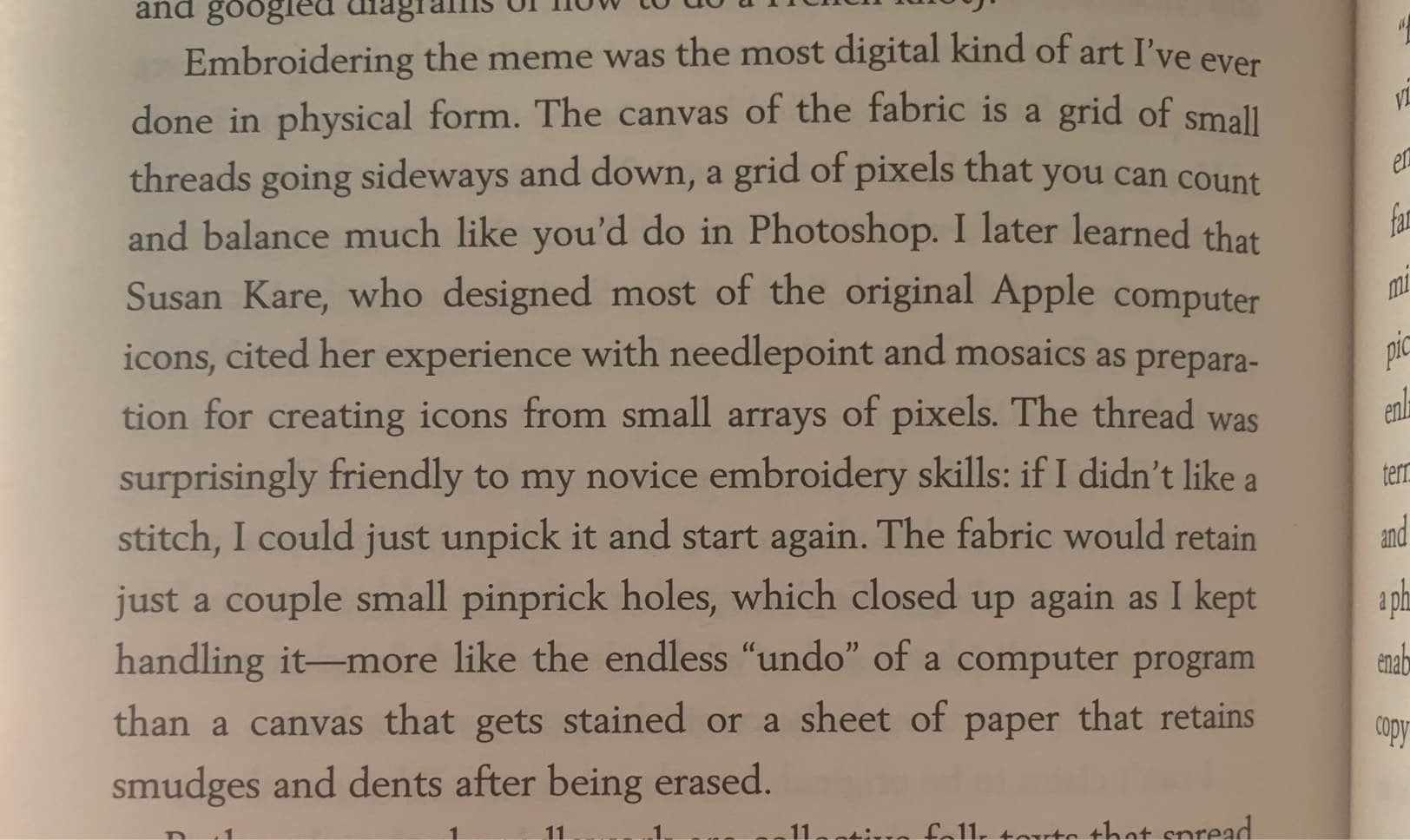Project Ideas for a Lockdown Situation
What kinds of things can you make when the fablab is closed?
Project Ideas and inspiration
Search the Fab Academy project archive: http://fabacademy.org/2019/
Use the Google custom search at the bottom of the page.
Instructables - loads of great project ideas: https://www.instructables.com/ and classes: https://www.instructables.com/classes/
A collaborative list of “Making and Prototyping Resources for Designers” here: https://docs.google.com/document/d/1z9LTUSnsCzg3ukG-GRQVC3w-OHYxJg1u88qn6yv2NTU/edit#heading=h.m6m64wyno28o
How can design students make their work without access to university facilities such as workshops, fablabs, simulation suites, computer labs and technical support.
Book: The Art of Tinkering https://www.amazon.co.uk/Art-Tinkering-Working-Intersection-Technology/dp/1616286091
an unprecedented celebration of what it means to tinker: to take things apart, explore tools and materials, and build wondrous, wild art that’s part science and part technology.
COVID19 Projects
Can we help?
Lots of co-ordinating resources online:
- https://www.helpfulengineering.org
- https://makezine.com/2020/03/22/whats-plan-c-for-covid-19/?mc_cid=dca2dc5958&mc_eid=036572ef54
- https://www.3dcrowd.uk
- https://community.andmirrors.co.uk/t/covid-19-laser-cut-face-shield/168
- https://gitlab.fabcloud.org/pub/project/coronavirus/tracking
- https://covidbase.com/7d1a6f8ef0b9434b87e68cbe05d8a9d6?v=1d23e01e433147edb0ee7b49474734eb
I haven’t found any organising site (like those above) for machine-sewable masks, but I have seen various individual projects, e.g. https://www.instagram.com/p/B-ZbzykDEeY/?igshid=j5moq8alr80j
Clothing for social distancing
- https://www.dezeen.com/2014/05/31/diy-dress-expands-to-protect-womens-personal-space-kathleen-mcdermott/
- https://laughingsquid.com/spike-away-a-vest-that-helps-protect-your-personal-space-in-public/
- https://www.vice.com/en_uk/article/akw3wg/protect-personal-space-london-big-city-suit
Basic electronics/Microbit materials and suppliers
If you can spend a little money, it’s easy to get electronics prototyping materials online:
Microbit
Microbit authorised retailers: https://microbit.org/buy/?country=GB (I recommend Pimoroni). Or look for cheap ones on eBay – £7-15
Microbit plus some simple electronics in a kit
https://uk.rs-online.com/web/p/processor-microcontroller-development-kits/1877030 – £32
https://shop.pimoroni.com/products/micro-bit-complete-starter-kit – £38
https://www.kitronik.co.uk/5618-bbc-microbit-with-inventors-kit-and-accessories.html – £40
Microbit plus separate electronics kit (Microbit not included)
https://coolcomponents.co.uk/products/elecfreaks-tinker-kit-for-bbc-micro-bit-micro-bit-not-included – £38
https://www.kitronik.co.uk/c5603-inventors-kit-for-the-bbc-microbit.html – £25
Arduino Uno (clone, board only, £10)
https://www.amazon.co.uk/ELEGOO-Board-ATmega328P-ATMEGA16U2-Cable/dp/B01EWOE0UU/
Arduino Uno Small Kit (clone, £14)
Arduino Uno Larger Kit (clone, £28, includes many more inputs and outputs)
Online simulators
Free (but I only recommend as a last resort, as your projects will be very limited (and it’s not as much fun!)
Microbit
Arduino
- https://www.tinkercad.com/circuits
- https://www.programmingelectronics.com/arduino-simulator-tinkercad/
Focus on sharing and distribution
Part of the ethic of a fablab is about machines and tools, but it’s also about the sharing of knowledge; making something useful that can be replicated by others; building a community around a project or idea. (See the covid19 face shields above for great examples)
Can you make something and share the instructions? Can you refine a design to make it easily replicable by others? Can you produce great documentation that inspires people to try it themselves? Think:
- Distributed Design
- [Open Source(https://opensource.com/tags/diy-and-maker-culture)]
-
CAD, rendering and CAM
You may not be able to print your model, but you can model it in 3D, and create toolpaths or beautiful renders in Fusion 360.
Also check out Blender, a free high-end tool for creating rendered 3 D objects, scenes with lighting and materials, and animations. https://www.blender.org
I’m starting to learn Blender. I got from nothing to this delicious doughnut in one day with the help of this excellent video series: https://www.youtube.com/playlist?list=PLjEaoINr3zgEq0u2MzVgAaHEBt--xLB6U

Creative coding
Lots of tools for computer-based making, designed for non-technical users:
- Processing
- P5.js (Processing, but in a web browser)
Watch the amazing Coding Train tutorials to get started, e.g.:
Intersted in visualising epidemics, infections and viral behaviour? Try D3: https://d3js.org
Project examples
Biomaterials
Lots of room for experimentatin here. Might need to buy some suppplies online. Maybe also good to collect some instuctions/guides:
Capacitative touch sensing with pencil and paper
Using simple materials to enable remarkably sophisticated interactions: https://www.instructables.com/id/Turn-a-pencil-drawing-into-a-capacitive-sensor-for/
Tin foil membrane switch
https://www.instructables.com/id/Foil-Capability-Switch/
Toy hacking
With legendary Simone Giertz: https://makezine.com/2017/02/06/toy-hacking-simone-giertz/
Exploratorium workshop – intended for kids, but same principle work for adults:
https://www.exploratorium.edu/sites/default/files/tinkering/files/Instructions/toy_take_apart_0.pdf (PDF)
Discover what makes your toys move, make noise, and light up by taking them apart! Use tools such as screwdrivers, scissors, and saws to explore the inner circuitry and mechanisms. Take apart more than one toy to hack them together to make something new!
Moulding and casting
Mould tool doesn’t have to be made on the milling machine, and there are plenty of moulding materials other than silicon. e.g. soap:
https://www.instructables.com/id/5-Minute-Homemade-Soap/
ALso, for scuplting your own pattersna to make mold tools:
Cardboard prototyping
You should be doing this anyway! Before making a 3D printed enclosure for your project, make a prototype out of carboard. Some fine techniques here: http://www.judepullen.com/designmodelling/
Soft circuits
Huge collection of great electronics + textiles projects here, including many inspiring technique explorations. 100% recommended!
Also https://www.instructables.com/class/Wearable-Electronics-Class/?utm_source=newsletter&utm_medium=email
Embroidery, weaving and other meanings of “digital”

Hi-lo tech
High-Low Tech was a research group at the MIT Media Lab from 2009-2014. HLT’s work integrates high and low technological materials, processes, and cultures. Our primary aim is to engage diverse audiences in designing and building their own technologies by situating computation in new cultural and material contexts, and by developing tools that democratize engineering.
Low-tech future
Thinking about a future without high-tech? Start here: https://www.lowtechmagazine.com/low-tech-solutions.html
And if you’re serious, here: https://www.opensourceecology.org/gvcs/
The Global Village Construction Set (GVCS) is a modular, DIY, low-cost, high-performance platform that allows for the easy fabrication of the 50 different Industrial Machines that it takes to build a small, sustainable civilization with modern comforts. We’re developing open source industrial machines that can be made at a fraction of commercial costs, and sharing our designs online for free.